Damian blowing out the candles on his birthday cake.
(We were so sick of cake by his birthday because
of Lily’s ginormous cake a few days earlier, that Damian
got a little cake so that there would be absolutely
no leftover cake afterwards.)
08 January 2009

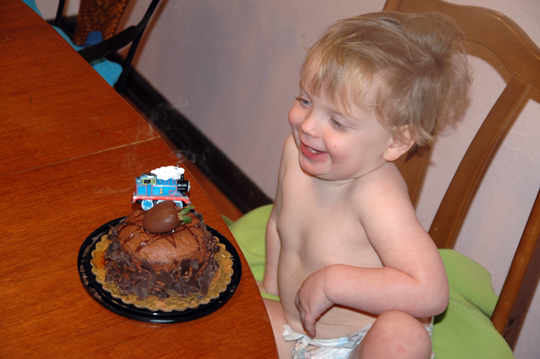
I watched this 20 minute video, The Story of Stuff, and then read Your Money or Your Life (it was on the recommended reading list on The Story of Stuff website, and I happened to have it on my bookshelf, so I dusted it off and read it). After watching and reading these two things, I’ve been depressed because the framework of my reality has been torn down.
Considering that I’m a modern suburban hippy (or at least I thought I was), you wouldn’t have thought that the environmentalist ideas presented would have thrown me for such a loop. You see, I was so used to blaming big business, advertising and the government — and waiting for them to fix the problem — that  I never really examined my role in the process. The movie and the book covered two ideas that, though they may not be novel, are still presented in a very personal, cogent and immediate manner:
1) We — you and me — drive consumerism. Without our willing participation, the system will not work. In all fairness, we were raised from our cradle by society to be consumers, but now we are being shown that we don’t have to live within the paradigm with which we were raised.
2) Here, I am going to quote Mr P.J. Ruane who left this comment on Amazon regarding Your Money or Your Life: “Your income depends on the number of hours you work, so if you spend frivolously, you are not spending your money, you are spending your lifetime. e.g. You earn $10 per hour tax paid? then if you spend $400 on something (that is probably really of no benefit to you, that you didn’t really need), you are really spending 40 hours of your lifetime for that useless item. To most people that is a working week. Multiply that a few times and most of our working lives are spent for NOTHING.”
There was another comment on Amazon that I liked very much from Eric Scarbro: “As with all revelations, the reader needs to be ready to hear the message.”
So where does this leave me? I’m free-falling now. I don’t have an answer. More than just a habit has been changed, the framework of how my reality works has been changed. I have no reference now, and so feel very lost.
But that’s not neccessarily a bad thing. However it is a very uncomfortable thing. Where is the line between enough and mindless consumption? I don’t know. But at least I know there is one now.
This is a really good spot for a Mary Poppins quote. 🙂
Enough is as good as a feast.
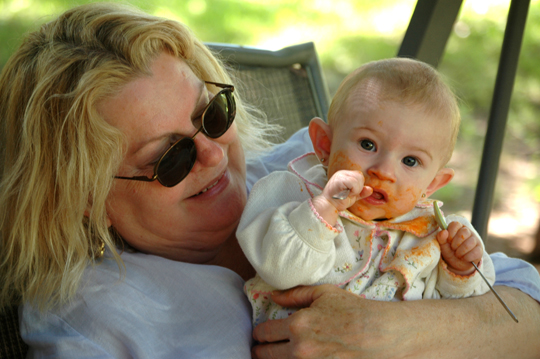
Nana just finished feeding Clara her carrots.
15 April 2008
I learned something new on the subject of personal finance recently. I read this very good article on mortgage products. (Say that again with me: mortgage products; the word alone should send up a red flag.) I highly recommend reading it. What I learned: people no longer own their homes. Instead people continuously take out home equity loans. A quote from the article:
In the case of Bob and Jane and those like them, Scurlock uses a language long forgotten. “They’re sharecroppers,” he says. “They don’t own their home. They’re just renting their home and refinancing every few years.”
It is so easy to think, “I’m not renting my home from the bank; I’m buying my home.” But with all of the interest front-loaded onto the loan and very little of your mortgage payment actually going towards the principal, we are most definitely renting our homes, especially if you refinance every few years and start the cycle all over again.
We have credit card debt, as I have mentioned before. And I was completely on-board with taking out a home equity loan to pay off the credit card debt at a lower interest rate.  It seemed like a no-brainer. But that is because I was reading the literature propaganda from the bank. A quote from Mortgage Loans: Costly Mortgage Mistakes:
Use Your Equity Wisely
You should never exceed 80% of your home’s value when it comes to your primary mortgage and any home equity loans you carry. By maintaining that 20% equity “cushion†you are protecting yourself from economic downturns. If the value of your home drops in a declining market you could end up owing more than your home is worth.
Many homeowners use equity for repairs or to consolidate other high interest debt. The equity you have is your ownership of your home; use equity wisely, if you are considering a vacation or a new car you might want to think twice.
This is all new information to me.
Another very good quote from the article:
“I think the biggest change,” says Scurlock, “has been the way debt is marketed. It’s very much sold as a product now. I think we’re being taught to think of it no differently than a pair of shoes, or a cup of coffee, or anything else that’s marketed … The fact that it’s a liability has really been obscured and lost.” [The emphasis is mine.]
And from all this new knowledge, I have also made a deduction:Â do not get your financial advice from the bank.
The children playing in the backyard at sunset.
15 March 2008


I don’t gamble; I have never gambled. Gambling is a losing proposition. You know that the odds are in favor of the house. Why give away your money?
Yet, with all my education and savvy — with all of my self-righteous attitude — I still got involved with credit cards… icky, horrible credit cards. Talk about giving your money away. I should just go to Discover Card and write them a check for several thousand dollars — why bother with the thinly-disguised middle man of 22% APR.
I hate credit cards, and yet I have never evolved the self-discipline to get out from under their thumb of financial slavery. Was the Illustrator book worth it? Was the plushie Belle doll worth it? Are any of our transitory consumer trinkets worth indenturing our future and the future of our family?
I read this article on credit card rates increasing even though the Federal Reserve is cutting rates, and I got so upset with myself for ever getting involved with these legalized loan sharks in the first place.
Five years ago, when we got that first credit card to pay for Savannah’s vet bills, my only knowledge was: “Credit cards are bad.” Now I understand so much more. I understand how the whole debt trap works — the interplay of the minimum payment, exorbitant APRs, and outrageous fees. You combine these with our consumer culture and the human desire for immediate gratification, and you have a money-making machine for the banks.
But I guess, like I’ve said before, out of adversity comes knowledge and experience. I’ve read many personal finance books and understood them on a theoretical level.  But now that I have personally lived the chapter on “Consumer Debt,” I understand it intimately. So let me pass my knowledge onto any young people that might be reading this entry: “Credit cards are bad. Stay away from them. If you can’t afford it, don’t buy it.”
It’s 12:30 in the morning, and my whole family is asleep. Lily has had a very exciting couple of days because her cousins, aunts and uncles have been here for the Thanksgiving holiday. Since she is overtired from two days of excitement, we had a lot of “instant meltdown” this evening.
And our house, which was already messy before Thanksgiving started, has surpassed into “what the hell?” after hosting family for two days. And I am supposed to be catching up on our finances right now. People who already overspend, like Matt and myself, tend to really overspend during the holiday season. The holidays are a dangerous time for rampant consumers, like an alcoholic being invited to an open-bar wedding — you can get through it, but you have to be mindful of your weakness at every moment until the party is over… if you drop your guard for too long, you fall back into impulse and habit and wake up the next morning with regret.
Thanksgiving piccies:
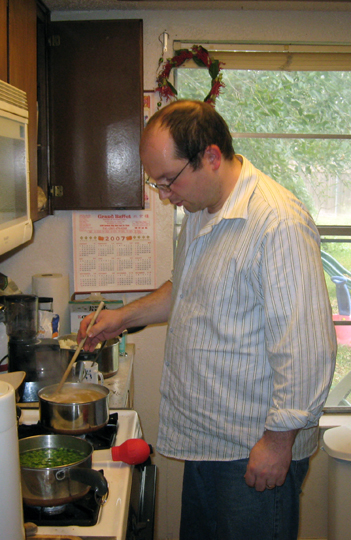
Matt preparing the Thanksgiving feast.
Matt, the expatriate Englishman who never celebrated Thanksgiving
before coming here in 2000, has cooked our Thanksgiving feast
for the last four or five Thanksgivings. He said it’s not difficult
at all because Thanksgiving dinner is the same as Christmas
dinner in England. In fact, that is how Glenn described
Thanksgiving: “a dress rehearsal for Christmas.” This year,
Matt’s meal was amazing. Really amazing.
Thanksgiving 2007
22 November 2007
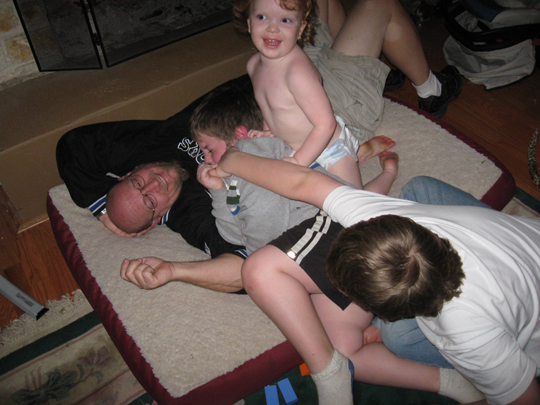
Tickle-mania!
Thanksgiving 2007
22 November 2007
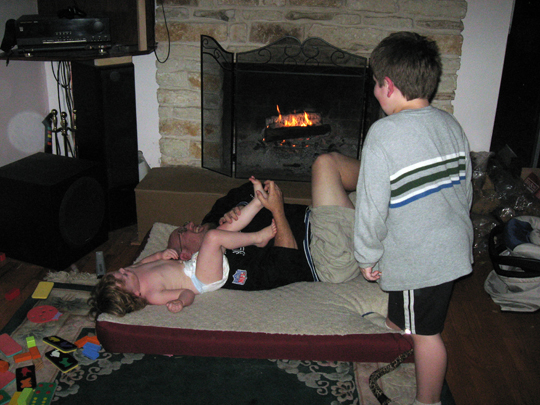
More tickle-mania.
Thanksgiving 2007
22 November 2007
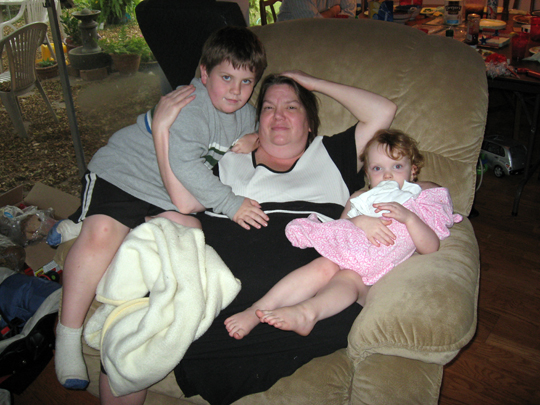
Logan, Carla, and Lily, as always, holding Clara
Thanksgiving 2007
22 November 2007
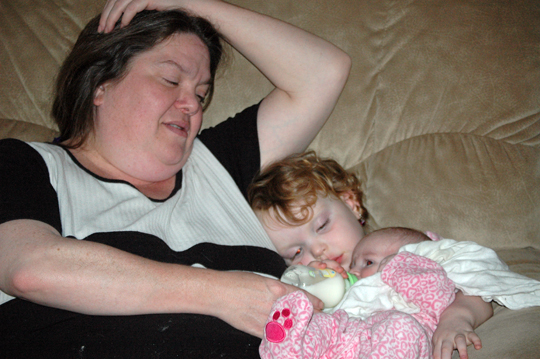
Carla and Lily feeding Clara
Thanksgiving 2007
22 November 2007
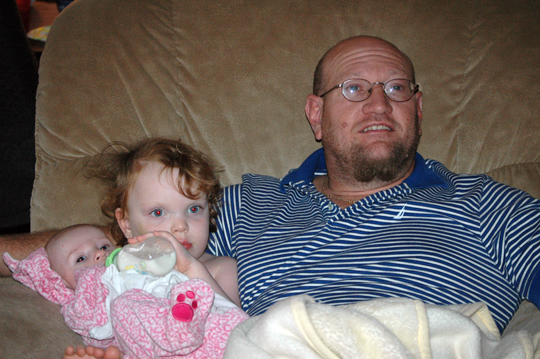
Steve and Lily feeding Clara
(The three of them are watching
the Cowboys game in this picture.)
Thanksgiving 2007
22 November 2007
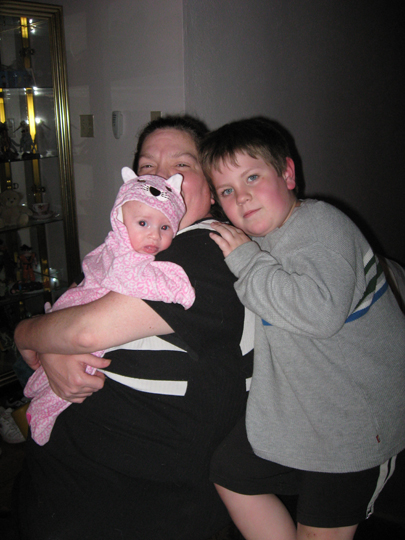
Carla with her kids
(This picture also shows the very cute
kitty-cat ensemble Clara was wearing.)
Thanksgiving 2007
22 November 2007
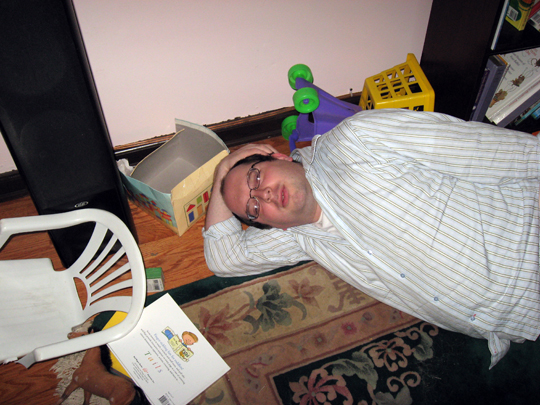
Matt falling asleep on the floor after cooking and eating all day.
(Isn’t that what Thanksgiving is all about — cooking and eating?)
Thanksgiving 2007
22 November 2007
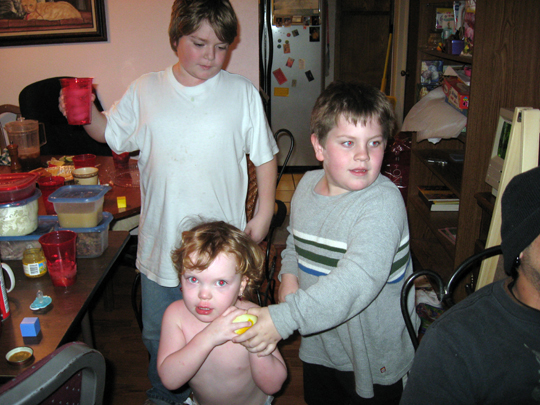
The older cousins
Thanksgiving 2007
22 November 2007
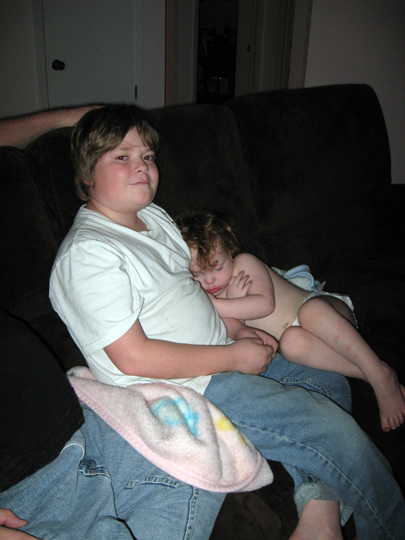
Lily fell fast asleep on Cody
after a full day of playing with her cousins.
Thanksgiving 2007
22 November 2007
We had a wonderful Thanksgiving full of food and family. I hope everyone else had a wonderful Thanksgiving too. 🙂

Pumpkin-carving time!
28 October 2007
I lack discipline and willpower. I have always lacked discipline and willpower (thus, the seven years it took me to get an undergraduate degree), and it has always annoyed me. With discipline and willpower, you can achieve your goals more consistently… and I am very goal-oriented. You’d think I’d have more discipline since I am so goal-oriented, but there it is.
Matt and I have put ourselves into debt — you know, the new American Dream for our generation — somewhat due to circumstances but mostly due to our own lack of discipline with money and spending. While surfing one day, I was reading someone’s profile, and he described himself as a “recovering consumer.” Well, I’m not recovering yet. I’m only on the first step: admit that you have a problem.
We would like to move to a larger home for our growing family in a neighborhood with better schools. We were both bullied and teased in school, and we’re not keen on our children going to a rough school. I don’t think the elementary school in our area is that rough, but the high school certainly is. I hated high school, but that is a different story. And I would like my children to enjoy their school years, if possible.
But we need to get out from under this debt. And so we’re back to discipline. We have made an aggressive debt-reduction plan, and now it comes to executing it. If we stay the course, we can start looking for a new home within two years.
Developing a new personality trait, though possible, is never easy nor quick. We’ll see how I come along over the next two years as I try to build discipline… yet again.